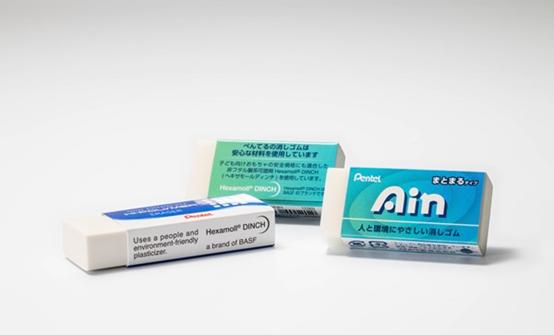On November 16, BASF Japan Co., Ltd. (hereinafter referred to as "BASF") and Patone Stationery Co., Ltd. (hereinafter referred to as "Patone"), one of the manufacturers of traditional Japanese stationery products, announced that Patone will completely switch to BASF's non-phthalate plasticizer Hexamoll® DINCH to produce erasers under the "Ain" and "Hi-POLYMER" brands of polyvinyl chloride (PVC). At the same time, through this cooperation, Patone has become BASF's "Hexamoll® DINCH Trusted Partners" in Asia Pacific. The two companies have also entered into a brand alliance, one of which is to label the ingredients on the packaging of the eraser. PVC erasers made using Hexamoll® DINCH are sold all over the world where Patone operates.

Plasticizers are chemical additives that provide elasticity to PVC. It is essential for the manufacture of erasers. At present, about 80% of the plasticizers on the Japanese market are phthalates. For safety reasons, restrictions on the use of phthalate plasticizers have been increasing in recent years, particularly in Europe. As a result, Patone has completely switched to Hexamoll® DINCH at its PVC rubber production plants in Japan and Taiwan to replace phthalate plasticizers. As of 2020, about 80% of the erasers produced by Paitong are made of PVC, and all PVC erasers sold by Paitong in Japanese stores and overseas are now made by Hexamoll® DINCH.
Kawasaki Takaaki, General Manager of Patone's Product Strategy Department, said: "Our motto is 'Discover the Best', which allows us to strive to the ultimate in terms of technology, quality and sense of use in the production process. In particular, erasers – our flagship products are of top-notch quality in terms of erasability, reduced eraser shavings and break resistance. The complete switch to BASF's Hexamoll® DINCH plasticizer provides added value because it is more human and environmentally friendly. We currently sell these erasers mainly in Japan and other parts of Asia, but in the future, we also plan to work hard to expand into the global market. ”
BASF's Hexamoll® DINCH is a non-phthalate plasticizer specially developed for human contact applications. Since its launch on the market in 2002, BASF has invested 7 million euros in toxicity studies on Hexamoll® DINCH. The study focuses on the impact of products on the environment and human health. Hexamoll® DINCH is approved and certified by numerous authorities around the world*. In sensitive applications such as toys and medical devices, it is used to replace traditional phthalates.
Masatoshi Shoyama, Head of BASF's Petrochemical Division in Japan, said: "I am delighted that, through this collaboration with Payton, the erasers made using Hexamoll® DINCH will be sold in co-branded packaging for the first time. Since the commercialization of the project, Hexamoll® DINCH has established a solid position in the plasticizer market for applications such as food packaging, medical devices and toys. We will continue to work with our Japanese customers to provide sustainable products to the market. ”
Through the Sustainable Solutions Guide**, we assessed Hexamoll® DINCH's contribution to the three dimensions of sustainability, namely economic, environmental and social. Hexamoll® DINCH was rated as a "transcendent" solution that contributes to the sustainability of the industry's value chain.
disclaimer:
The content of this article is synthesized from BASF, etc., compiled by the editor of Red-Eyed Rabbit, please indicate the source when reprinting. If it involves the content of the work, copyright and other issues, please contact this number in time, we will delete the content in the first time!